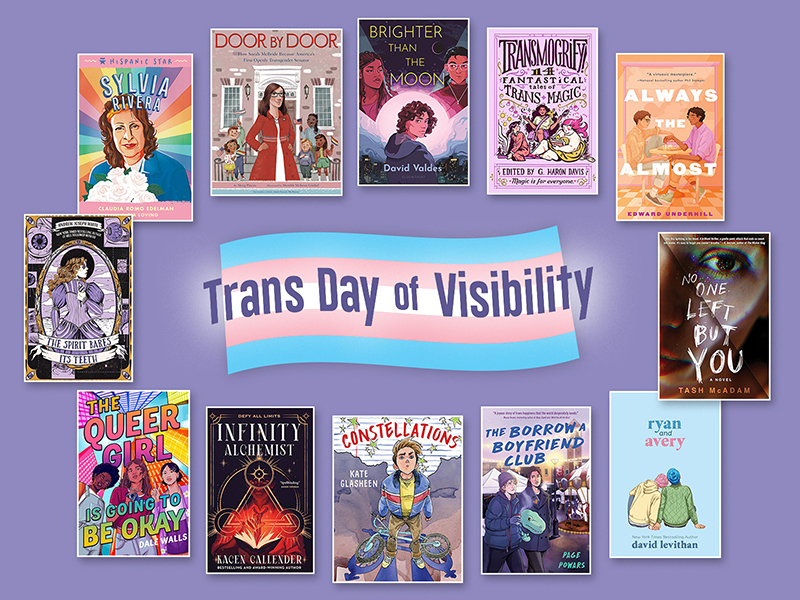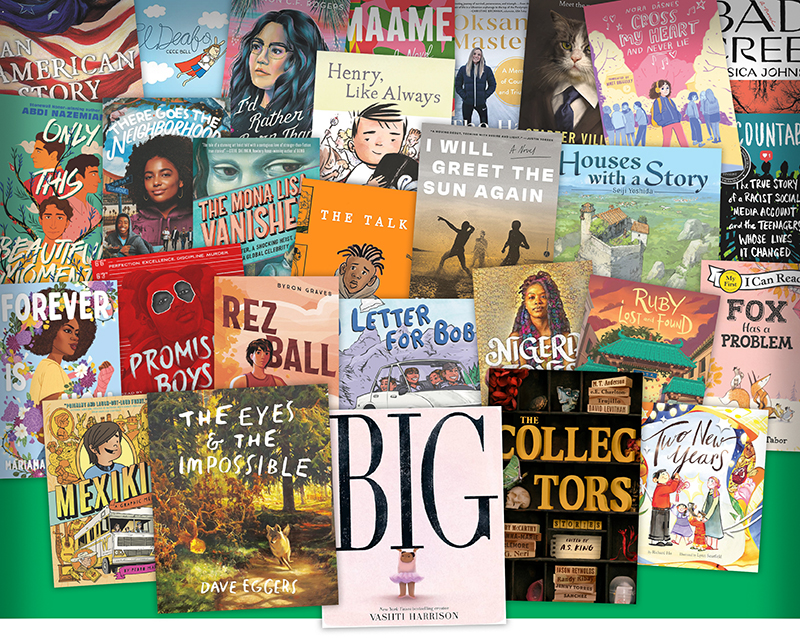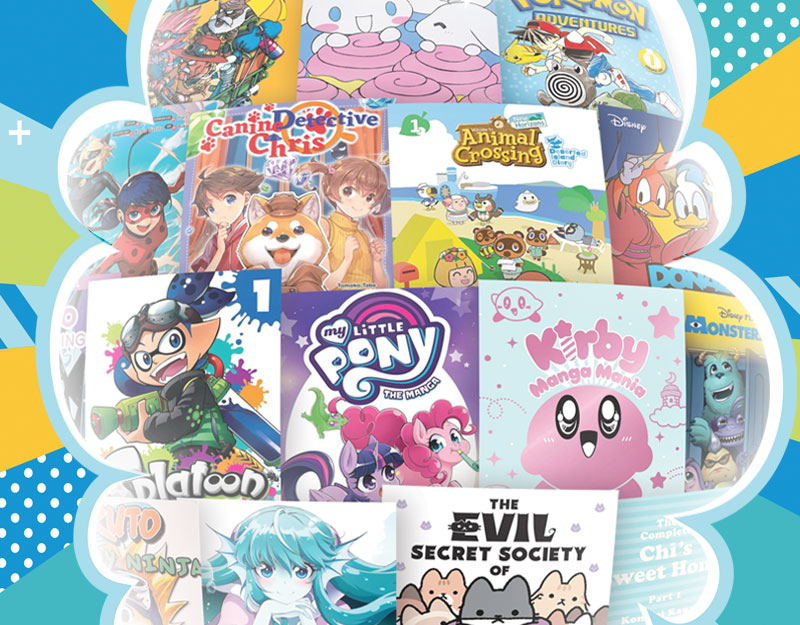Self-Control Through Trial and Error: An Abby Hanlon Q&A and Deep Dive Into Dory Fantasmagory
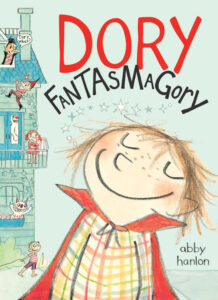
Ten years. Wow. Can you believe that it was a decade ago that I first laid eyes on my very first Dory Fantasmagory book? I know this for a fact because I just dug up my old review of it, and here’s what I had to say at the time:
- “Pick up my jaw from the floor and lob it my way because this book is AMAZING! Perfection of tone, plot, pacing, art, you name it.”
- “If it encourages only one big brother or sister to play with their younger sibs then it will have justified its existence in the universe.”
- “In a word, fantastico.”
- “A true blue winner.”
I’ll stand by every last one of those words too. Now here we are, all of us older and wiser, and not only is the sixth Dory book, Can’t Live Without You, is out, Dory’s appearing on stage in her own musical, and (best of all) Abby Hanlon has come onto the blog today to chat with me!! Could this day get any better?
ADVERTISEMENT
ADVERTISEMENT
Betsy Bird: Abby! So lovely to get a chance to talk to you! And congrats on your amazing sixth Dory book! Boy, this is a series that has had some serious legs. Did you ever think when you wrote that first book that you’d be seeing a sixth coming out in 2023?
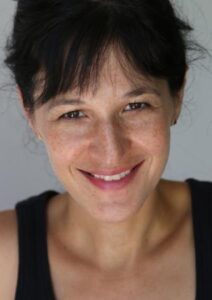
Abby Hanlon: Hi Betsy! Thanks so much for talking to me today. I remember exactly where I was when I read your review of the first Dory book almost 10 years ago, and I always think of that review as having launched this series. So I’m delighted to hear a beloved early reader is interested in what Dory is up to in 2023.
No, I didn’t think I would be writing a sixth book at this point. I couldn’t imagine that I would get so many letters from kids asking for more books and that the series would gain popularity over time. I thought that this would be a two or three book series – which felt very ambitious at the time. Gradually, Dory has gained more recognition but the series for so long felt kind of like a cult phenomenon; the news passed slowly by word of mouth, but the people who loved it were bonkers about it. From the beginning, fans dressed like the Dory characters for Halloween. But when I asked them, “Did anyone know who you were?” the answer was always a definitive, “Nope!”
Sticking with this series has been an exercise of faith. And I’ve had to work hard to ensure that the dialogue and plot development continue to feel authentic to kids’ experiences.
BB: See, now I’m regretting that I never went as Mrs. Gobble Gracker for Halloween in the past. I suppose there’s always next time! Now here’s a question for you: How has Dory, as a character, grown and changed over the course of the series? Or has she? Is the Dory in the 6th book the exact same as the first or has she had a little maturing?
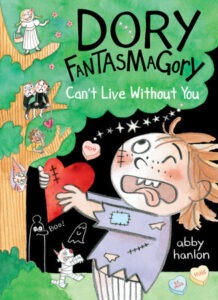
AH: In book 5 Dory declares, “I’m not growing! It’s not even my birthday! It’s never my birthday!” Which is pretty much true. We don’t see a lot of change in Dory. Though Dory has been in the same grade throughout the series, the seasons have changed. She started the school year (book 2), made it through bunchy winter coat season (book 4), and is in her backyard in her bathing suit on a chilly spring day (book 5). So, while we don’t really see Dory mature, she does have moments of growth. I think in book 5 when her sister Violet is ensnared in a friend drama, we see Dory’s growth the most. She demonstrates empathy for Violet that I don’t think she could summon in Book 1. Then in book 6, we see Dory regress and suffer separation anxiety after getting lost while on an errand with her mom. So in this way, I would say Dory’s growth sort of mirrors a real kid, which often feels like one step forward, two steps back.
BB: Beautifully put. Sometimes when a series character has proven sufficiently popular with a younger crowd, they might start coming out with slightly older books (Babymouse, Amber Brown, etc.). Any chance we might see a slightly older Dory someday, or do you think she’ll pretty much remain this age?
AH: I can’t picture doing this with Dory. It’s so fun writing about a six-year-old because that seems to be the age when imaginary play is at its peak. And I love writing about kids playing. At this age, imaginary games can be all encompassing and are more layered and complicated as kids have more knowledge and experience to feed into their games.
I also think this is a compelling age for me to write about because it’s so emotionally volatile. There’s not a lot of middle ground for Dory, and I think kids really enjoy laughing at her extremism. I think if she turns seven, that would be okay, as long as the chaos remains. Early elementary school is such a transformative time. Kids learn to develop self-control through trial and error and, for me, the fun lies in that process. I think age six/seven is also a time when kids deepen their friendships and learn about other people’s sensitives. I really enjoy writing about these early attempts to forge connections. There is so much social emotional learning happening at this age as kids realize the impact of their choices and try to understand each other.
ADVERTISEMENT
ADVERTISEMENT
BB: So in addition to your fantastic Dory book series, I had the esteemed pleasure of seeing a production of DORY FANTASMAGORY here in Chicago at the Greenhouse Theater Center. It was a really clever adaptation that was perfect for its young audience. Did you have any hand at all in the final stage adaptation? Or did you just find out what they’d done afterwards?

AH: I’m so glad you got to see the play in Chicago. I didn’t get to see it and was not part of the adaptation. I did get to see the Dory musical in Manhattan in 2022 put on by the New York City’s Children’s Theater which was also fabulous. Seeing my characters singing and dancing felt surreal – it was like sitting in an audience watching one of your more lucid dreams.
BB: Finally, do you think we’ll be seeing more of Dory in the future? Are you working on anything else these days?
AH: I am working on the 7th Dory book now. Book six was hard for me, in part because I had to walk a very fine line to make sure that Dory getting lost and then asking questions about death was funny for kids and not anxiety producing. Book seven will be a cinch after that.
Great greasy gobs of thanks to Abby Hanlon for taking the time to answer my questions today. Special thanks too to Kaitlin Kneafsey and the folks at Penguin Young Readers for helping put this whole discussion together. Dory Fantasmagory: Can’t Live Without You is already out, so make a beeline to your nearest bookstore or library and check it out pronto!
Filed under: Interviews
About Betsy Bird
Betsy Bird is currently the Collection Development Manager of the Evanston Public Library system and a former Materials Specialist for New York Public Library. She has served on Newbery, written for Horn Book, and has done other lovely little things that she'd love to tell you about but that she's sure you'd find more interesting to hear of in person. Her opinions are her own and do not reflect those of EPL, SLJ, or any of the other acronyms you might be able to name. Follow her on Twitter: @fuseeight.
ADVERTISEMENT
ADVERTISEMENT
SLJ Blog Network
Name That LEGO Book Cover! (#53)
Exclusive: Vol. 2 of The Weirn Books Is Coming in October | News
Fighting Public School Book Bans with the Civil Rights Act
North Texas Teen Book Festival 2024 Recap
ADVERTISEMENT





